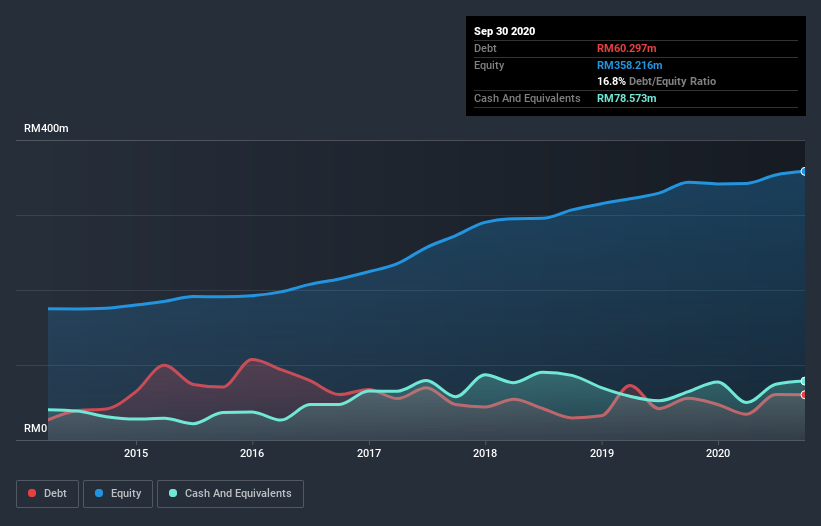David Iben put it well when he said, 'Volatility is not a risk we care about. What we care about is avoiding the permanent loss of capital.' It's only natural to consider a company's balance sheet when you examine how risky it is, since debt is often involved when a business collapses. Importantly, Johore Tin Berhad (KLSE:JOHOTIN) does carry debt. But the more important question is: how much risk is that debt creating?
What Risk Does Debt Bring?
Debt and other liabilities become risky for a business when it cannot easily fulfill those obligations, either with free cash flow or by raising capital at an attractive price. In the worst case scenario, a company can go bankrupt if it cannot pay its creditors. While that is not too common, we often do see indebted companies permanently diluting shareholders because lenders force them to raise capital at a distressed price. Of course, debt can be an important tool in businesses, particularly capital heavy businesses. When we examine debt levels, we first consider both cash and debt levels, together.
Check out our latest analysis for Johore Tin Berhad
What Is Johore Tin Berhad's Net Debt?
The image below, which you can click on for greater detail, shows that at September 2020 Johore Tin Berhad had debt of RM60.0m, up from RM55.8m in one year. But on the other hand it also has RM78.6m in cash, leading to a RM18.5m net cash position.

How Strong Is Johore Tin Berhad's Balance Sheet?
According to the last reported balance sheet, Johore Tin Berhad had liabilities of RM106.4m due within 12 months, and liabilities of RM8.81m due beyond 12 months. On the other hand, it had cash of RM78.6m and RM108.6m worth of receivables due within a year. So it can boast RM71.9m more liquid assets than total liabilities.
This short term liquidity is a sign that Johore Tin Berhad could probably pay off its debt with ease, as its balance sheet is far from stretched. Simply put, the fact that Johore Tin Berhad has more cash than debt is arguably a good indication that it can manage its debt safely.
The good news is that Johore Tin Berhad has increased its EBIT by 4.8% over twelve months, which should ease any concerns about debt repayment. When analysing debt levels, the balance sheet is the obvious place to start. But ultimately the future profitability of the business will decide if Johore Tin Berhad can strengthen its balance sheet over time. So if you're focused on the future you can check out this free report showing analyst profit forecasts.
But our final consideration is also important, because a company cannot pay debt with paper profits; it needs cold hard cash. Johore Tin Berhad may have net cash on the balance sheet, but it is still interesting to look at how well the business converts its earnings before interest and tax (EBIT) to free cash flow, because that will influence both its need for, and its capacity to manage debt. In the last three years, Johore Tin Berhad's free cash flow amounted to 39% of its EBIT, less than we'd expect. That weak cash conversion makes it more difficult to handle indebtedness.
Summing up
While we empathize with investors who find debt concerning, you should keep in mind that Johore Tin Berhad has net cash of RM18.5m, as well as more liquid assets than liabilities. On top of that, it increased its EBIT by 4.8% in the last twelve months. So we don't think Johore Tin Berhad's use of debt is risky. There's no doubt that we learn most about debt from the balance sheet. However, not all investment risk resides within the balance sheet - far from it. To that end, you should be aware of the 1 warning sign we've spotted with Johore Tin Berhad .
Of course, if you're the type of investor who prefers buying stocks without the burden of debt, then don't hesitate to discover our exclusive list of net cash growth stocks, today.
If you decide to trade Johore Tin Berhad, use the lowest-cost* platform that is rated #1 Overall by Barron’s, Interactive Brokers. Trade stocks, options, futures, forex, bonds and funds on 135 markets, all from a single integrated account. Promoted
New: Manage All Your Stock Portfolios in One Place
We've created the ultimate portfolio companion for stock investors, and it's free.
• Connect an unlimited number of Portfolios and see your total in one currency
• Be alerted to new Warning Signs or Risks via email or mobile
• Track the Fair Value of your stocks
This article by Simply Wall St is general in nature. It does not constitute a recommendation to buy or sell any stock, and does not take account of your objectives, or your financial situation. We aim to bring you long-term focused analysis driven by fundamental data. Note that our analysis may not factor in the latest price-sensitive company announcements or qualitative material. Simply Wall St has no position in any stocks mentioned.
*Interactive Brokers Rated Lowest Cost Broker by StockBrokers.com Annual Online Review 2020
Have feedback on this article? Concerned about the content? Get in touch with us directly. Alternatively, email editorial-team (at) simplywallst.com.
About KLSE:ABLEGLOB
Able Global Berhad
An investment holding company, manufactures and sells tin cans and dairy products in Africa, Asia, Central America, North America, South America, Mexico, Malaysia, and internationally.
Undervalued with excellent balance sheet and pays a dividend.
Market Insights
Community Narratives



